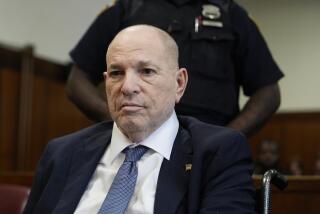Harvey Weinsteinâs scorched-earth defense against rape allegations has had some success. It could also backfire
In the six months since his arrest on sexual assault charges, Harvey Weinstein and his legal team have not hesitated to strike back at those who have accused him of wrongdoing.
The women who say they were victims? Unreliable and opportunistic.
The cops who investigated him? Corrupt.
The prosecutors who obtained the indictment? Not interested in justice â merely bowing to the intense pressure brought on by a #MeToo movement that in many ways sees Weinstein as its arch-villain.
Faced with accusations from nearly 80 women in New York, Los Angeles and London, Weinstein could serve extensive jail time if convicted as a serial sexual predator. But his scorched-earth defense strategy has won him some short-term victories.
One of the six criminal charges against him already has been dropped, and one of the detectives who led him into a New York City police precinct in handcuffs has been taken off the case. The head of the NYPD unit that investigated Weinstein was transferred out of his sex crimes assignment, then retired last month.
The first true test of Weinsteinâs hellbent approach, however, may come in a Manhattan courtroom on Thursday, when a judge will rule on a motion to dismiss the remaining five counts of sexual assault
Legal experts say attorney Benjamin Brafman has done well to challenge the credibility of the New York Police Department and the Manhattan district attorneyâs office.
But his strategy is not without risk.
The repeated attacks on Weinsteinâs accusers could hurt the movie mogulâs already tarnished image and make him even less sympathetic in the eyes of a jury.
âThereâs a cruelty, thereâs a double-blaming of the victim, to his argument.⌠They are victimized when theyâre attacked and then theyâre humiliated when they have to maintain a modicum of ordinary interaction with a monster,â said Eugene OâDonnell, a former New York City police officer and prosecutor who teaches at the John Jay College of Criminal Justice at City University of New York. âMost people will identify with that sense of powerlessness.â
In October 2017, the first of dozens of women came forward to accuse the Hollywood titan of a wide array of misconduct. Weinstein has been charged in Manhattan with forcing former actress Lucia Evans to perform oral sex on him in 2004; attacking another woman, Mimi Haleyi, in 2006; and sexually assaulting an unidentified woman in a hotel in 2013.
The Times typically does not name women who make accusations of sexual assault, but Haleyi and Evans have told their stories in public. The claims against Weinstein helped spark the #MeToo movement, leading to the professional destruction and criminal prosecution of a number of high-profile entertainers and politicians who saw women accuse them of harassment and assault.
In hundreds of pages of court documents filed since May, Brafman has sought to subvert the movementâs central narrative â that women accusing powerful men of sexual misconduct should automatically be believed.
When prosecutors in October dropped the charge related to Evansâ accusation â a decision that followed the discovery of emails that suggested inconsistencies in her testimony â Brafman was quick to argue that her âperjured testimony contaminated the grand jury proceedingsâ and called for the remaining five counts on the indictment to be dropped.
In other court filings, Brafman has revealed friendly communications between the remaining accusers and Weinstein that took place after the dates of the alleged assaults.
The emails and continued conversations, Brafman has said, invalidate the assault claims. In his most recent filing, Brafman said he could produce a friend of the unidentified accuser in the alleged 2013 assault who would testify that the woman had attended a private movie screening with Weinstein mere hours after the incident was said to have taken place.
âThe emails demonstrate that these women who now allege sexual assault by Mr. Weinstein have for years engaged in loving and often intimate conversations with him before and after the date of the alleged assault,â Brafman wrote in a November filing.
Sonia Ossorio, president of the National Organization for Womenâs New York City chapter, said Brafman and Weinstein are peddling a narrative that is both antiquated and offensive.
âIt is no way proof that an assault didnât take place,â she said of the email traffic. âIt doesnât translate into every interaction being consensual.â
OâDonnell, the former New York prosecutor, also said Brafman might be overplaying his hand in referring to the emails and communications as exculpatory evidence. The women, several of whom had Hollywood aspirations, might have felt compelled to maintain a relationship with Weinstein because of the influence he commanded at the time, he said.
âItâs a throwback argument that ignores the relationships that can be very complex in these situations,â OâDonnell said. âThe fact that somebody stays in contact with somebody with such awesome power, who wields such influence, that in and of itself is, at best, inconclusive.â
Brafman also repeatedly has set out to discredit the police and prosecutors involved in Weinsteinâs arrest.
NYPD Det. Nicholas DiGaudio became a target after prosecutors admitted that he had advised an accuser to delete personal information from her cellphone if she did not want it to appear in a public court record.
Ultimately, no information was deleted from the phone and the accuser has said DiGaudio had no influence on her testimony, according to court filings. But the perception of police misconduct has been a common drumbeat from the Weinstein camp.
Over and over again, Brafman has argued that prosecutors failed to turn over exculpatory evidence in the form of emails or statements from friends of the accusers who could provide testimony favorable to the defense.
In response to each motion, prosecutors have said they are under no legal obligation to turn over such evidence during a grand jury hearing and have dismissed Brafmanâs arguments as an attempt to litigate the case in the press.
But though prosecutors have dismissed Brafmanâs all-out assault as bluster, other legal experts see it as necessary. The veteran defense attorney has bested the Manhattan district attorneyâs office in high-profile cases before, but Brafman also knows what could likely happen if a toxic figure like Harvey Weinstein ends up in front of a jury.
âHis sentiment is: âIf you can get this jettisoned now, thatâs not just saving this guy from a trial,ââ OâDonnell said. âThatâs saving this guy a very high likelihood that he will probably be convicted.â
Follow @JamesQueallyLAT & @LACrimes for crime and police news in California.
More to Read
Sign up for Essential California
The most important California stories and recommendations in your inbox every morning.
You may occasionally receive promotional content from the Los Angeles Times.












